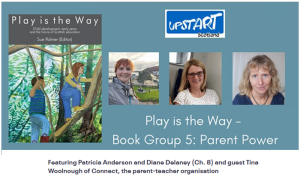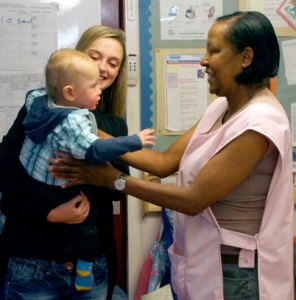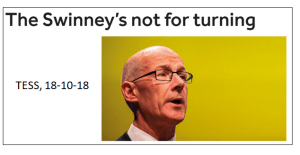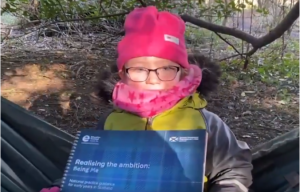by Diane Delaney
 When the Give Them Time Campaign was invited to present at the Play Is The Way Book Group, to discuss our chapter, ‘Parent Power’, we decided to ask parents who support our Campaign the following questions:
When the Give Them Time Campaign was invited to present at the Play Is The Way Book Group, to discuss our chapter, ‘Parent Power’, we decided to ask parents who support our Campaign the following questions:
- What is the best method of providing evidence to parents that early level education should be about play and development?
- How do we rally parents to push for changes in education at a local and national level?
The anonymous results, collected by Survey Monkey, may be of use to the Upstart Campaign as they look to spread the word about the critical importance of play across the early level of Curriculum for Excellence, especially in terms of ensuring that parents are aware of the positive impact that play has for learning, development, health and wellbeing.
Question 1: The role of professionals
 Our question about the best method of providing evidence on the importance of play produced a clear pattern of responses. The view of parents in our survey was that Early Years professionals, including Health Visitors, are key people to provide information of this kind to parents, and they thought this information sharing (especially the scientific evidence base) should start from pregnancy and birth. At each stage of contact with Health Visitors these discussions could form part of visits.
Our question about the best method of providing evidence on the importance of play produced a clear pattern of responses. The view of parents in our survey was that Early Years professionals, including Health Visitors, are key people to provide information of this kind to parents, and they thought this information sharing (especially the scientific evidence base) should start from pregnancy and birth. At each stage of contact with Health Visitors these discussions could form part of visits.
Parents also suggested that any professional/practitioner/person organising children’s play groups or activities could also be a key information provider, also opening up opportunities for discussion forums and even training opportunities for families. Parents believe that, on first contact with an ELC setting, information, they should be provided in a variety of formats about the benefits of play on child development and learning including leaflets, posters, information packs and videos.
Finally schools must continue to communicate that ‘play is the way’ in P1/2 – and this means there will need to be a fundamental change in primary education in early level to ensure that everyone at every level in education provides a consistent message that they can actually deliver on.
Respondents also referenced longstanding issues, with which our campaign is all too familiar, about Local Authorities’ discretion around
- implementation of national policies
- the information they publish and communicate to service users, families and children (and their staff too).
 From what we’ve learned, in view of the conflict between information on the national position (from Scottish Government) and that from organisations that support play-based learning and later formal schooling (e.g. Upstart Scotland, Play Scotland, Connect), Local Authorities are reluctant to initiate any significant change.
From what we’ve learned, in view of the conflict between information on the national position (from Scottish Government) and that from organisations that support play-based learning and later formal schooling (e.g. Upstart Scotland, Play Scotland, Connect), Local Authorities are reluctant to initiate any significant change.
On the whole, LA officials are unclear about the scientific evidence which now informs a few Local Authorities, such as Falkirk, which have accepted that ‘play is the way’.
Question 2: Pushing for change
 Our second question asked parents about pushing forward change locally and nationally. The responses revealed common themes around the need for parents to access the scientific evidence base in a family friendly/easy read format.
Our second question asked parents about pushing forward change locally and nationally. The responses revealed common themes around the need for parents to access the scientific evidence base in a family friendly/easy read format.
An overwhelming majority of parents stated that social media platforms are the best method for publishing information, creating groups, forming campaigns and driving forward any push for change. Platforms including ‘Facebook’, ‘Twitter’ and ‘Whatsapp’ were cited frequently. Many parents cited the Give Them Time campaign’s social media platforms as the route into understanding their rights on deferral and ability to join a campaign to lobby for change.
Other suggestions relating to media included TV adverts and documentaries (many people suggested a case study such as following a family through their own process of learning about child development and play through ELC and transition to school). Many parents suggested that the voice of children should be amplified and heard around their experiences of ELC, school and how play had an impact on their experience of learning as well as their health and wellbeing. Both younger and older children could contribute to this, providing a variety of perspectives from different age groups.
Empowering parents
 It is the responsibility, duty and right of parents to make decisions about their child’s health, wellbeing, welfare and education. This is set out clearly in law. These responsibilities and duties are not simple and many parents who contact our campaign group find it difficult to weigh up the options about what is best for their child.
It is the responsibility, duty and right of parents to make decisions about their child’s health, wellbeing, welfare and education. This is set out clearly in law. These responsibilities and duties are not simple and many parents who contact our campaign group find it difficult to weigh up the options about what is best for their child.
This is mainly as a result of conflicting information and advice, coming from friends, family, the media and professionals. To cut through the confusion, we need consistent, evidence-based, child-centred information from professionals and organisations.
We need to see more accountability about the information published by Local Authorities that can influence parent decision-making. All information published should provide source/references to the evidence underpinning policies, and there should always be a balance in arguments weighing up positive and negative aspects of policies such as deferral or play-based learning. To achieve this we need all Local Authorities to be on board and it appears that only national legislation can truly enforce Local Authorities to do this.
Our campaign has succeeded in changing the law nationally, but children and families need to wait until 2023 for this to be rolled out in every Local Authority area in Scotland. We are delighted at the success of our campaign but frustrated at this delay. However, we have been able to provide consistent, accurate information to anyone who contacts us about parent and child rights and the law. Raising awareness of parental rights – and the huge discrepancies in practice across Scotland’s Local Authorities – has led to a wider discussion on this area of a child’s life.
 We can’t wait until 2023 to promote parent power regarding deferral and play-based learning. We urge all child, parent and family advocates, rights-based organisations and those interested in child health, wellbeing and education to work with, help and support parents. Provide them with the information they need to make the best decisions and support Upstart and Give Them Time by urging Local Authorities to change their policy on deferral, ensure play-based learning is guaranteed in every primary school and provide accurate, consistent information, based on reliable evidence.
We can’t wait until 2023 to promote parent power regarding deferral and play-based learning. We urge all child, parent and family advocates, rights-based organisations and those interested in child health, wellbeing and education to work with, help and support parents. Provide them with the information they need to make the best decisions and support Upstart and Give Them Time by urging Local Authorities to change their policy on deferral, ensure play-based learning is guaranteed in every primary school and provide accurate, consistent information, based on reliable evidence.

